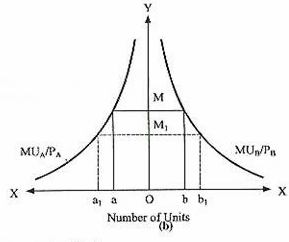Law of Equi-marginal Utility
Assumptions:
1. Income constant
2. Tastes are also given
3. Intention to maximize his or her satisfaction
4. Price conscious
5. Rational consumer
Suppose two goods, A and B. So long as the marginal utility of money spent on goods A is nor equal to the marginal utility of money spent on goods B, the consumer will increase his satisfaction by substituting one goods for another until the marginal utility of money is the same for the both commodities. If the marginal utility of money spent on the goods A is greater than the marginal utility of money spent on goods B, the consumer will withdraw some money from the purchase of goods B and will spend it on goods A till the marginal utility of money for two commodities becomes equal.
Diagrammatical Representation:
Fig: Law of equi-marginal utility
OX axis = Goods A
OX’ = Goods B
OY = Utility of money spent on goods A and B
UA = MU of money spent on goods A
UB = UM of money spent on goods B
Suppose, a consumer has Tk. 10 to spend on the two goods A and B
Tk. 6 for goods A and Tk. 4 for goods B. in this case, the marginal utility of both goods are canal ( CD = EF). In this condition, he will derive maximum satisfaction and any other arrangement will reduce the aggregate satisfaction.
To prove this condition,
Suppose, Tk. 1 more on goods A and consequently Tk. 1 less on the goods B. As a result, the marginal utilities will become unequal (GH is greater than QR). In this case, the gain in utility is less than the loss thereof and his total utility will be less than before.
Limitation of the Law:
1. All consumers are not expert in calculating and rational. The fact is that, most of our expenditure is governed by habits.
2. Goods are not divisible into bits to enable consumers to equalize marginal utilities.
3. People are sometimes slaves of customs or fashion.
4. Ignorance of the consumers. The consumer may not be aware of other more useful alternatives.
Hence, no substitution takes place and the law of substitution does not operate.
You can see more article about Agricultural Economics
Important Agricultural Websites
